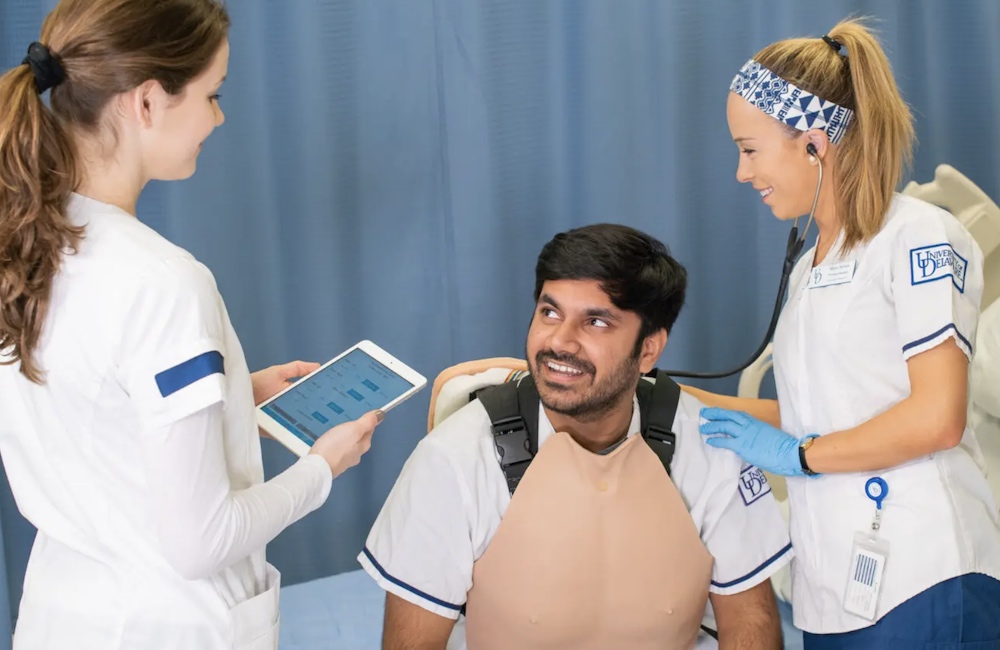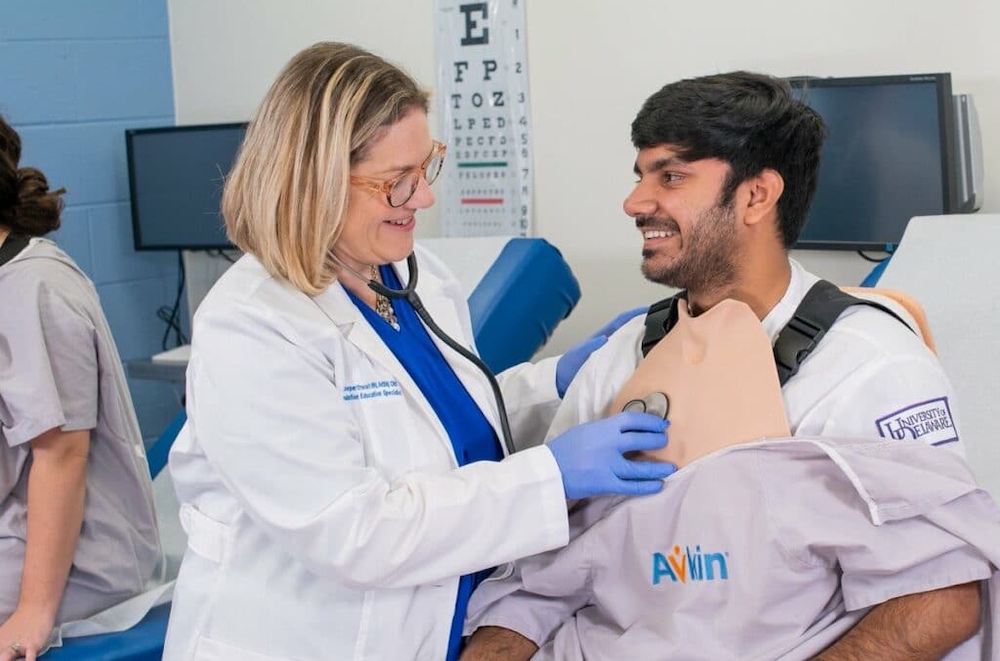To help facilitate the most authentic clinical simulation experiences and scenarios, healthcare educators often turn to wearable simulations. At the forefront of simulation education and training, wearable simulators can help enhance standardized participants (SPs), also called simulated patients, through realism and the opportunity for visual feedback. In an effort to meet the education demand for wearable simulators, Avkin has developed several products specific to various areas of medical training. This article will specifically discuss the benefits of the company’s Avtone and Avstick wearable simulation products.
Avtone: Avtone is a wearable heart and lung sound chest and back plate that can be integrated into any current simulation or to test out scenarios. Helping to redefine heart and lung sound simulation, speakers play real patient heart and lung sounds, so learners can gain a realistic simulated learning experience. Learners use their own stethoscope to identify landmarks and assess 13 heart sounds and four lung sound options that are controlled by an app in real-time.
The ability to control the simulator with an IOS/ Android app connected via Bluetooth offers simulation lab leaders the ability to take full advantage of this wearable simulation technology. Additionally, Avtone is compact and lightweight, making it easy to take from the clinic to the classroom and the best alternative to medical manikins.
“Avkin wearable simulators provided a great way for students to listen to different heart and breath sounds… So happy that we were able to purchase these and our students had a great experience with the technology. I am teaching graduate-level courses for NP students, so my perspective is different and my needs are more advanced. This was a great product for both teaching and testing,” said Denise Vanacore, PhD, RN, CRNP, of Gwynedd Mercy University.
Avstick: For learners looking for the most realistic IV trainer, the Avstick redefines intravenous simulation. The Avstick leaves no trace after needle insertion with Smart Skin technology and offers a realistic puncture on the first stick and every stick thereafter.
With the patent-pending circulating system, users will experience the highest fidelity clinical simulation, including flashes upon insertion and realistic reactions from standardized patients. In addition, the Avstick offers easy vein replacement, mold-resistant blood, and easy transportability – which allows the clinical simulation lab to be an ambulance, classroom, or outdoors.
“Our IPE event was fantastic! Nearly 100 students participated in scenarios and the Avstick worked great! I look forward to working with college leadership to bring more Avkin products to the college,” said Ann Curtis, DNP, RN, of Maine College of Professions.
More about Avkin
Avkin exists to give healthcare learners the skills to rebound from failure. The company seeks to understand gaps in the learning experience, strives to adapt to the changing healthcare field, and focuses on the fundamental skills required of any healthcare profession. These are accomplished with a multipronged approach based on four tenets of simulation: build, train, create and wear. Consultation from Avkin’s education team has helped schools build their own sustainable, budget-friendly SP program.
Avkin also trains SPs and simulation faculty in best practices and effective feedback, ensuring learning objectives are met. Using the Simulation Subscription Library or custom-designed virtual telehealth simulations, Avkin works to create learnable situations ready for use by educational professionals. Finally, Avkin produces lifelike wearable devices which allow learners to immerse themselves in the learning experiences.
“[The future of nursing simulation is a mix of AR and simulated participants for training. There is no denying that VR/AR technology is just getting better. The key to better preparing learners for the clinic with this technology is to acknowledge that they will still not replace human interaction. I think the future of simulation is using VR and AR technology as an interactive way to complete repetitive tasks while using simulated participants to learn the human element, which can so easily be overlooked by cool tech,” explained Amy Bucha, chief scientific officer at Avkin.
Avkin has consistently been recognized for innovation in the healthcare simulation field. Its prototype of the Avtrach, a tracheostomy simulator, won the First Place Technology and Innovation Award from the Society for Simulation in Healthcare, leading to Avkin’s founding. It’s been recognized as a Best University Startup by the National Council of Entrepreneurial Tech Transfer, and even won a Golden Stethoscope award from a Shark Tank Edition of the Dr. Oz show.
Rooted in the Latin words “akin” and “vera,” Avkin combines the two. With Akin meaning “of similar character,” and vera meaning “truth,” the company’s goal has always been to create the best quality products that allow for education to be “of similar character” and “true” to what the learners will experience in real life.








